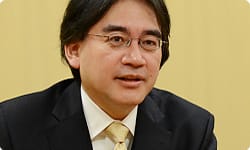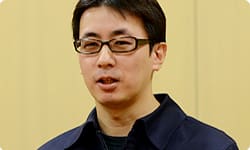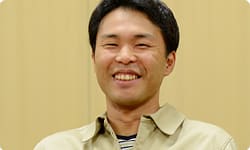Breathing Life into the Characters
So you completed the synopsis of the script by holing up at home in an entire day?
Well, I really concentrated on it. Like an old novelist, I wrote a page, crumpled it up and tossed it aside, wrote a page, crumpled it up and tossed it aside. (laughs) Then I thought, "This is good," and took the version I was satisfied with to the office.
What did Aonuma-san say when you showed it to him?
He gave it a cursory glance through and said, "Yeah, I think that's fine."
(laughs)
Did you feel like he had treated it lightly? (laughs)
Did I really seem like I was treating it lightly?
Well, I figured you were going to have various criticisms about it but you seemed very understanding! (laughs)
That's because all the key points were there.
I remember how relieved I was.
Aonuma-san, how aware were you of how worried Fujibayashi-san was?
Well, I've repeatedly worried about things like that an awful lot, too. So rather than commenting on it a whole lot, this time I wanted Fujibayashi-san to make The Legend of Zelda in line with what he thought it should be like. I thought it would be okay as long as there weren't the sort of contradictions that we mentioned earlier.
So the synopsis got the okay. Mori-san, then your work on the cinematics team could begin, right?
Yes. I was to write the dialogue based on the synopsis, so we met face-to-face and began hashing it out. But after hearing everything, the phrase, "That hasn't been decided clearly yet," always popped up. (laughs)
Horrible words. (laughs)
Yes. (laughs)
Those who make the cinematic scenes can't begin their work unless the content is clear. (laughs) What did you do? Considering the schedule, didn't you have to get cracking?
(looking troubled) Exactly.
So you started making the scenes, all the while pushing back your fear that what you made would go to waste later on.
Well, that's, you know…
You're used to it? (laughs)
Yes…you might say that. (laughs)
(laughs)
There are times when they say, "There's been a change," and we just say, "All right, we'll fix it." But there are other times when we resist.
You don't "resist," you "consult." (laughs)
That's right. There are times when we "consult."
(laughs)
Speaking from the viewpoint of a scriptwriter, various characters show up in the synopsis, and with regard to each one, it is—to use a somewhat grand expression—necessary to breathe life into them.
You start with limited information in the synopsis, expand upon that image of the character and bring it to maturity.
Yes.
How do you breathe life into characters?
Writing scripts is the same for everything from video games to novels, movies and anime, I believe. You have to delve into what lies behind the characters—what kind of life they have lived up until they appear in the work at hand and what they are thinking as they act.
That sounds like something an actor would say! (laughs) In other words, you have to get into character, including what doesn't actually appear in the game.
Exactly. When you do that, how the character feels in certain situations, how that changes as circumstances change, and what that character will say come bubbling up within you. But…
Yes?
When they say, "We changed that," I think, "But he wasn't the kind of character to do such a thing!" It just doesn't sit right with me at all.
And then you resist, or rather consult with, Fujibayashi-san. (laughs)
Yes, that's right. (laughs)
So Mori-san wrote the script and then passed the baton to Yoshida-san.
Yes. The staff around me draws storyboards for the script that Mori-san made, so I explained the scenario to them and had them draw storyboards. Then I had the motion designers make animation for those storyboards using 3D models.
You were in charge of turning what had been written on paper into actual animation.
Yes.
When I hear that, it sounds as if the work went incredibly smoothly, but in reality there was some pretty intense back-and-forth, right? (laughs)
Yes, that's exactly right. (laughs) Once you have animation, a lot both good and bad becomes clear. Then voices from all quarters start saying, "No, not like this! Not like that!"
When what isn't noticeable in words or in the storyboards actually appears as animation, everyone starts throwing out their opinions.
That's right. I take those opinions to the designers making the motion and then everyone start saying this and that.
It's hard to be caught in the middle. (laughs)
It sure is. (laughs)
Then it comes to the sound group, and Yoshida-san has an even harder time!
Once the visuals are in motion, then it's time to add sound.
Yes. A little while after putting sound to the animation, Yoshida-san started coming up and saying, "I'm sorry, but this changed"—like it was one of his primary work responsibilities! (laughs)
Like saying "I'm sorry!" was his job?
Yes! (laughs)
You had matched up the sound perfectly, but the timing changed, so you had to redo it.
That's right. But that's not Yoshida-san's fault.
Well… (laughs)
Things change for various reasons.
But Yoshida-san does at one point incur a little animosity? (laughs)
Yes. (laughs)
But he makes so many adjustments that development would have been in shambles without him.
(laughs)




